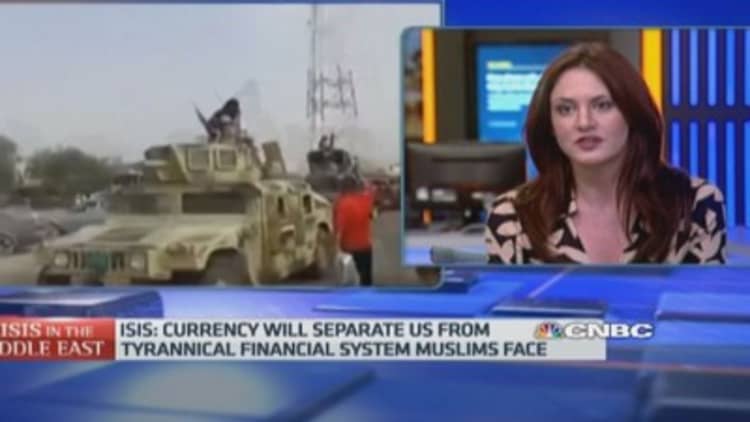What do jihadi militants crave on break at the battlefront? Pringles are one frontline favourite. Another is Red Bull.
Thousands of foreign fighters who have flocked to Syria want to create an austere Islamic state harking back to the past. But they have retained their taste for the modern-day snacks and gadgets of the western countries they disdain.
Locals are not only living in fear of these militants, who use brutal mass executions and beheadings to impose their rule, but they are also trying to find ways to survive an economic crisis provoked by three years of civil war. Many say that the best strategy is catering to the tastes of the fighters they loathe.
Read MoreISIS's effect on oil
Crisps, chocolates, energy drinks and non-alcoholic beer are the treats of choice for many foreigners fighting for the Islamic State of Iraq and the Levant (Isis), which has expanded across a swath of Syria and Iraq. It claims to be building a caliphate to emulate the days of Islam's prophet Mohammed.
More from The Financial Times:
Jihadis exploit porous European borders
Kobani fighters crave blood and batteries
Fueling ISIS Inc.
Isis' religious edicts and foreign fighters' tastes are transforming local economies in areas the group occupies. Shops selling alcohol are closed, while junk food vendors, clothing stores – especially ones offering military-style apparel – and mobile phone shops make a modest profit.
"The economy in Isis areas is now driven by the foreign fighters. Everything else is at zero," says Saleh, a clothing retailer from the central Syrian city of Raqqa.
Many shopkeepers in Syria's rural east had never heard of energy drinks like Red Bull before foreign Isis fighters arrived. Nor had vendors in the eastern city of Deir Ezzor ever dreamt of selling Snickers or Bounty – the favourite brands of chocolate bars for militants from Europe and the Gulf.
"These snacks were either unknown, or luxuries we couldn't afford . . . But when the fighters requested them, I didn't ask questions. I ran to my supplier and placed an order," says Nassim, a shopkeeper who used a pseudonym for his safety. "Pringles and Snickers? Isis guys buy those by the box to share at the front."
In Raqqa, a vendor who asks to be identified as Qasim says a can of Red Bull costs around 250 Syrian lira (about $1.50), while in Deir Ezzor, a tube of Pringles cost about $5.50. Both are well above the average $3 per day that most Syrians in the area now live on.
Local businessmen buy the crisps and non-alcoholic beer from regime-held areas, and add an extra 10 per cent to the price to cover the bribes at army checkpoints. Energy drinks and chocolates are brought over the border from Turkey.
Locals say Isis foreign fighters have a basic salary of at least $215 dollars a month – twice the average income civilians can hope to earn. On top of that are shares of war loot, a $3 daily food stipend, and frequent bonuses.
"They never even check prices," says Saleh. "Money isn't a concern for them."

In eastern Syria, shops in areas where local residents carry battered Nokia phones are now stocking the latest smartphones. The town of Deir Ezzor is under siege by Syrian forces and is often bombed up to 20 times a day, but that has not stopped eager local traders from using the only river crossing to bring in Samsung Galaxies and iPhones.
"We even have the iPhone 6 in Deir Ezzor," says a shopkeeper who asked not to be named. "The Isis guys, especially the ones from the Gulf, are obsessed with mobiles," he adds. "Every time a model comes out, they trade in their old one and buy the newest thing. If they don't bring a local [to the shop], you can add another 30 to 40 dollars. Maybe even more."
But while some businesses are thriving, others have disappeared: cafés – once a focus of neighbourhood life in Syrian towns – are now non-existent.
Read MoreISIS declares its own currency
"What do you do in a café? You smoke. That's forbidden," Qasim says. "Isis was always raiding cafés in Raqqa – they were the symbol of activist meetings and lovers' rendezvous – both absolutely unacceptable to Isis."
Harsh laws separating men and women have also made restaurants less popular for locals.
"Now all the restaurants in Raqqa except one have moved to delivery – we prefer to go home and eat among ourselves without them. The one restaurant that's open is filled with Isis fighters," Qasim says.
Shopkeepers and café owners are relieved to find a way to make ends meet in Isis controlled areas. But for the vast majority of Syrians, even the fighters' simple snack cravings are a bitter reminder of their second-class status.
"They govern us in the name of religion, living the good life while everyone else suffers," Nassim says. "Sometimes my customers say 'God willing, they'll eat it [the junk food] and get poisoned.' But there is nothing we can do."

